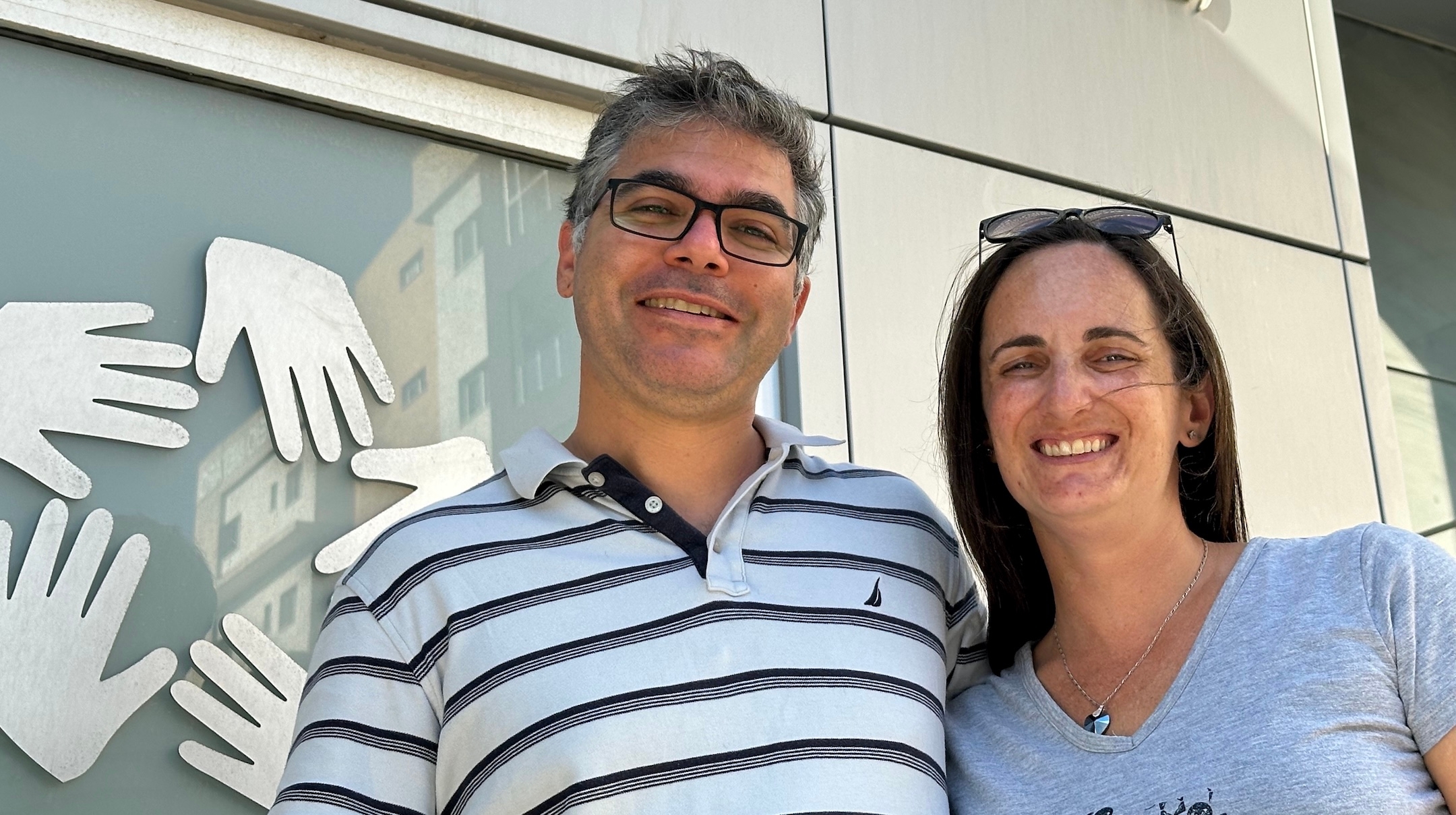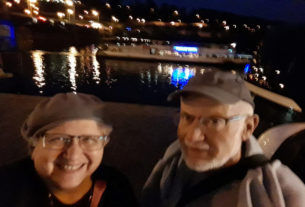LARNACA, Cyprus — Galia Sopher and her two young daughters had spent the night of Oct. 6, 2023, camping in the fields near their home in Kibbutz Mefalsim on the Gaza border when, at 6:30 the next morning, air-raid sirens woke them and rockets began raining down from the sky.
Sopher tried calling her husband, Amitai, at home, but he had already run into the shelter where there was no phone signal. The three made it back and joined him there, terrified because, although they had long since gotten used to sirens, they realized that this time was different.
“We started hearing machine guns and understood there were terrorists inside the kibbutz,” recalled the 36-year-old kindergarten teacher, who grew up in Mexico and spent the past 16 years of her life in Israel.
“We tried to get our girls to stay quiet, and waited for hours. We didn’t know if terrorists were hiding in the bushes,” said Sopher. “Finally, at around 3 a.m., we got a message that we could leave the kibbutz. While driving to our friend’s house in central Israel, we saw bodies all around us. I told our girls to cover their eyes so they wouldn’t see.”
She added sadly: “I don’t know how we got so lucky and why others didn’t.”
Despite her longtime Zionism, Galia — a former spokeswoman for the Israel Defense Forces — said remaining in Israel became too difficult emotionally in the wake of the horrors she and her family lived through. So four months ago, they relocated to nearby Cyprus, joining an exodus that’s quickly turning this Greek-speaking island into a sort of second Jewish promised land.
Rabbi Arie Raskin dances with other Israeli men after a ritual circumcision at the Bet Chabad in Larnaca, Cyprus. (Larry Luxner)
“Unfortunately, they keep coming,” said Rabbi Arie Raskin, who founded Chabad-Lubavitch of Cyprus 22 years ago. He estimates that 3,500 Israeli families, totaling around 15,000 people, now call the Republic of Cyprus home. That’s up from 2,000 families before the Oct. 7 attack.
“Every day, new families are arriving here, but they feel sad about it,” he said. “They always tell me it’s temporary.”
The flow of Israelis into Cyprus didn’t start with the war.
“In the beginning, people moved here because of the stress of living in Israel,” said Raskin, citing as one example protests over Prime Minister Benjamin Netanyahu’s proposed judicial reforms in the year before the war began.
“People couldn’t take it anymore. Whoever could pick himself up and work online just left,” he said. “And not only Cyprus but also Greece, Romania, any country in which they felt safe. Obviously, Cyprus — because of its proximity to Israel — makes it much more attractive.”
But proximity is not the only advantage. As a member of the European Union, Cyprus has a stable currency and liberal tax laws. The cost of living is dramatically lower than in Israel, and violent crime is virtually unheard of. More importantly, Israelis are warmly welcomed here — so much so that signs in the duty-free shops at Larnaca International Airport beckon travelers in English, Greek and Hebrew.
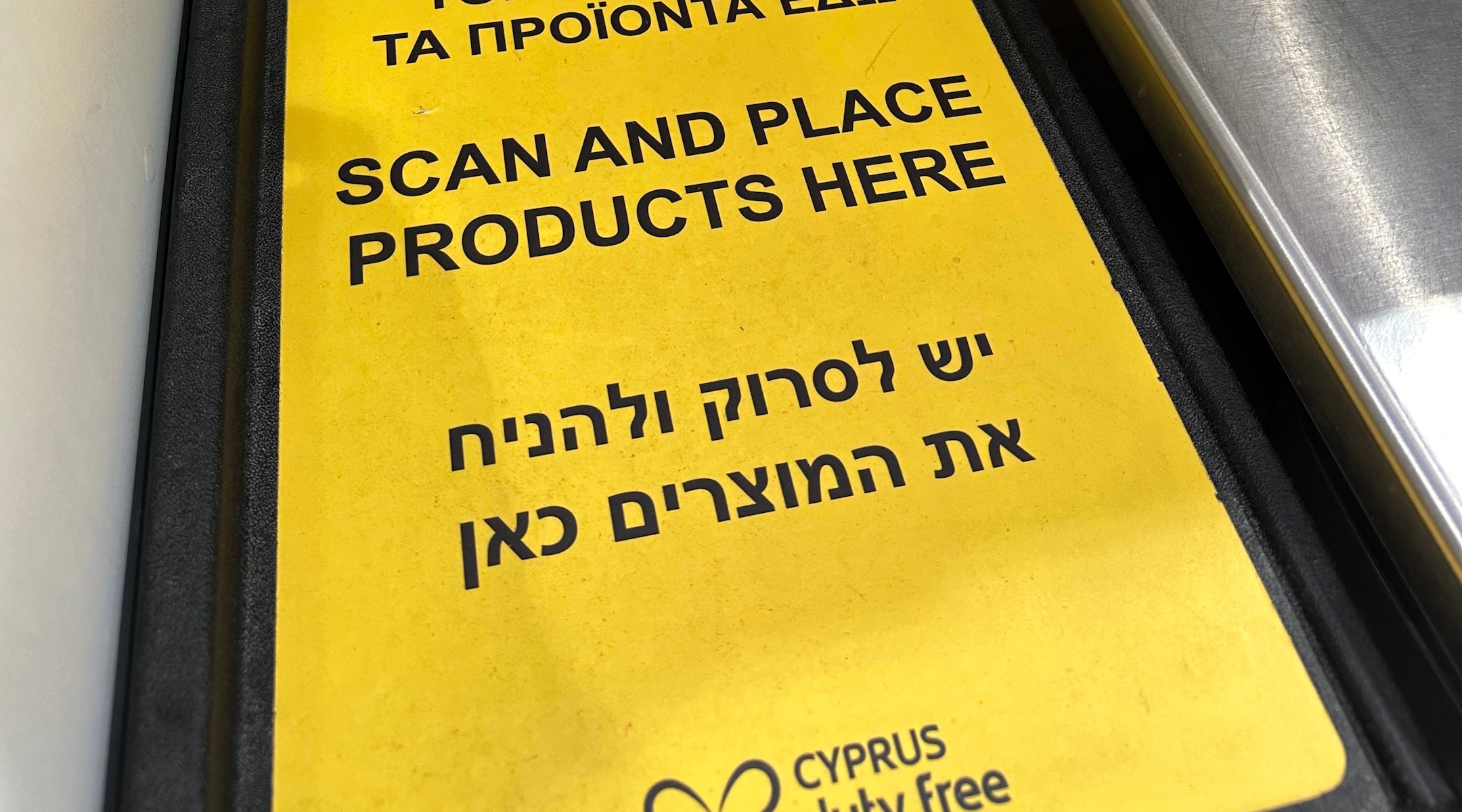
The duty-free area of the Lanarca, Cyprus, airport has signs in Greek, English and Hebrew. (Larry Luxner)
Last year, according to official figures, about 411,000 Israelis visited Cyprus, making them the island’s No. 2 source of tourism (about 10.7% of the total) after the United Kingdom, which has a 33.9% share of the pie.
Tel Aviv tech executive Amnon Keiny, 56, recently spent a long weekend in Cyprus with his wife, 54-year-old therapist Dafna Dariel. The couple came here because Keiny had been planning a Zoom call with a key U.S. client but didn’t want to risk staying in Israel and having his call interrupted by air-raid sirens.
“We needed somewhere nearby and were looking for the hotel with the best internet, so we ended up flying here this morning,” Keiny said over dinner at the 175-room Lordos Beach Hotel. “We left home at 5 a.m., and at 6:20, as we were buying coffee at the airport, the sirens started.”
Cyprus, in fact, has long been a popular wedding destination for Israelis who are unable or unwilling to marry under the auspices of the Israeli Chief Rabbinate, which recognizes only ceremonies performed according to Orthodox Jewish law. The need for an easy offshore wedding has declined somewhat since Israel’s Supreme Court ruled in 2022 that online marriage ceremonies are valid in Israel.
Still, the Israelis keep coming. Nicolas Kirkillari manages the Lordos Beach, located 20 minutes’ drive north of Larnaca’s airport. The hotel used to cater to Russians, but since the Russian invasion of Ukraine in 2022, the number of Russians visiting Cyprus has dropped from 800,000 a year to nearly zero due to EU sanctions and difficulty getting visas.
“The only solution for us was to find a new market to replace what was 20% of our tourism,” Kirkillari said. “This was a strategic decision, and we were already on the map for Israelis.”
Cyprus is even more on the map now that Turkish Airlines has stopped flying to Tel Aviv, and Israeli Jews don’t feel safe in once-popular Turkish destinations such as Antalya, Bodrum and Cappadocia.
That’s because Turkey’s government under President Recep Tayyip Erdoğan has taken an aggressive stance against Israel, cutting off trade and threatening to invade as a show of support for Hamas. In one notable example of the impact, hair transplant clinics have opened up in Nicosia, catering specifically to Israeli men who in years past might have traveled to Turkey for such operations.
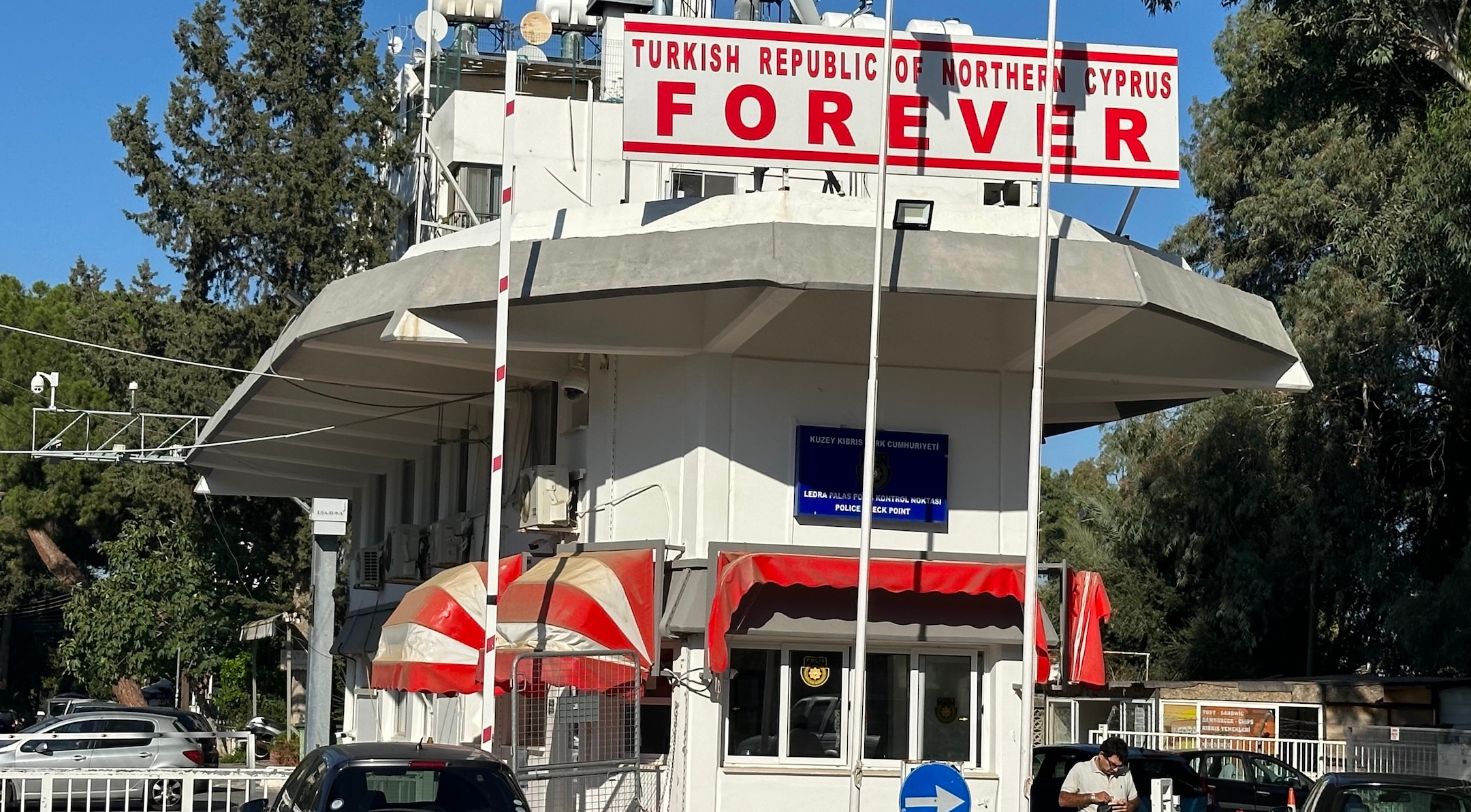
A checkpoint at Nicosia’s Ledra Palace Hotel welcomes visitors to the self-proclaimed “Turkish Republic of Northern Cyprus”. — which is recognized by no country except Turkey. (Larry Luxner)
The warm attitude toward Israel in Cyprus is also a change from the not-too-distant past.
“I remember the old days, when there used to be a communist president, Demetris Christofias,” Raskin told (JEWISH REVIEW), referring to the country’s leader from 2008 to 2013 who is also the only communist head of state in European Union history. “I came to visit him once, before Hanukkah, to bring him a menorah, and he started giving me a whole speech about Israelis killing Palestinians. But the current president [Nikos Christodoulides] stands with Israel in every possible way.”
Raskin said that right after the Oct. 7 attack, a few protesters gathered along Larnaca’s popular boardwalk, shouting “Free Palestine” and passing out baklava.
“Right away, I called the police chief, the minister of justice and the mayor of Larnaca, and they told me they weren’t going to allow this again,” said the rabbi, adding that he believes that the vast majority of the island’s Greek-speaking population sympathizes with Israel and the predicament it faces.
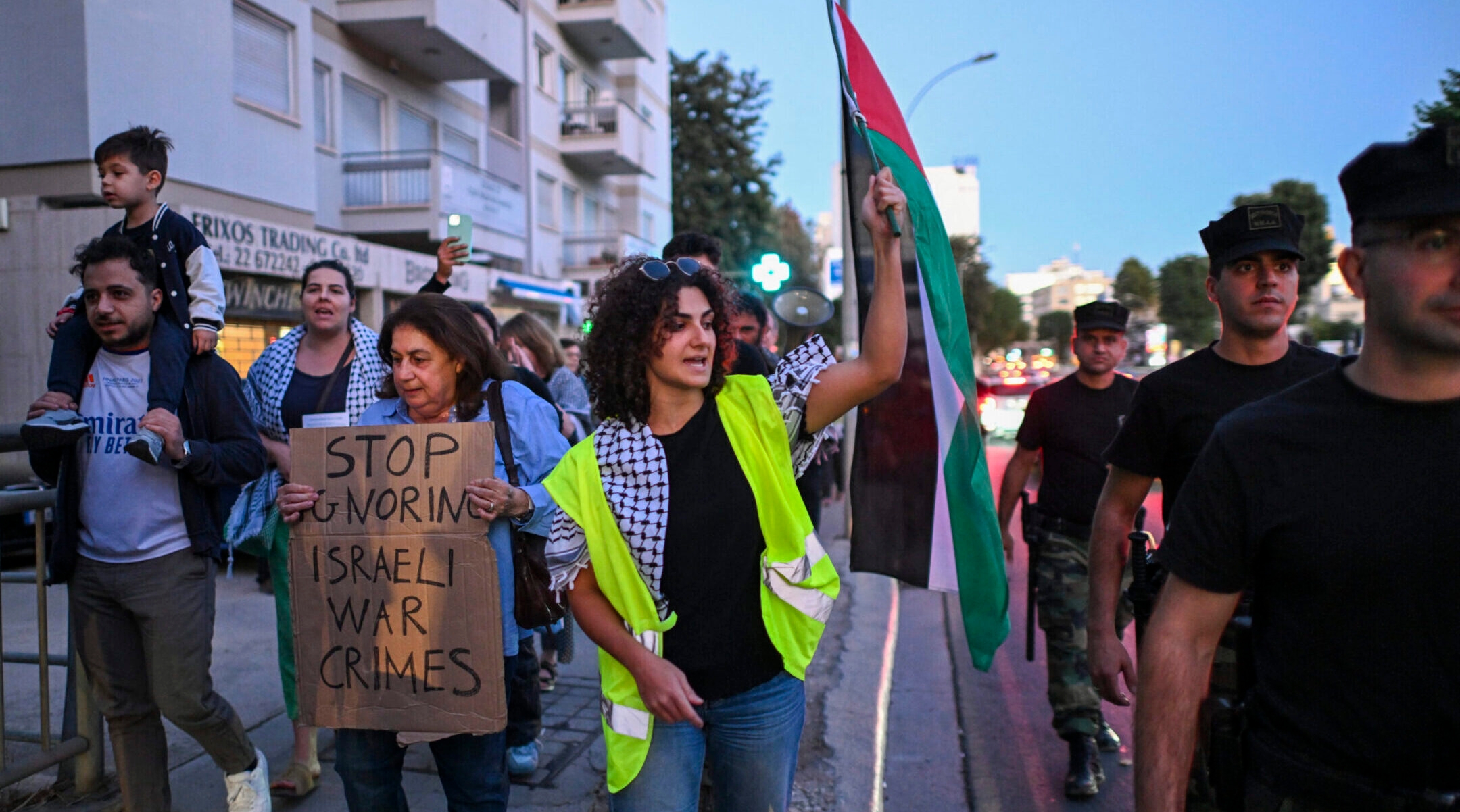
Protesters march along a street during an anti-Israel demonstration in Nicosia on Oct. 24, 2024. (Jewel Samad/AFP via Getty Images)
More recently, pro-Palestinian protesters staged a rally in Nicosia, which attracted a small crowd. But the country has not seen the major anti-Israel protests that have convulsed other places.
The fact that 36% of the island has been under Turkish military control since 1974 may explain any sympathy toward Israel. In fact, the 112-mile-long occupation line snakes from northwestern Cyprus all the way to Famagusta and cuts right through downtown Nicosia, which has the sad distinction of outlasting Jerusalem, Belfast, Beirut and Berlin as the world’s last divided capital.
At Nicosia’s Ledra Palace Hotel, barbed wire and a United Nations buffer zone separate free Cyprus from the self-proclaimed Turkish Republic of Northern Cyprus — an entity recognized by only one country: Turkey. Heavily armed guards at the checkpoint verify the passports of all who cross into the TRNC, even though Cyprus views the crossing not as a border but an abomination.
“The Cypriot people are living this trauma since 1974. What Hamas did to us on Oct. 7 is like what the Turks did to them,” said a retired Israeli who recently moved to Limassol with his wife but declined to give his name for fear of retribution. “And now they’re afraid — not only here but even in Greece — that the Turks will use this situation to start World War III.”
At Limassol’s sprawling new City of Dreams Mediterranean — one of Europe’s biggest casinos, with 100 roulette tables and 1,000 slot machines — Hebrew is the dominant language, spoken by masses of Israeli tourists. Limassol is the island’s second-largest city, complete with shipping port and world-class marina, and is also home to its leading Israeli expat community.
If all goes as planned, it’ll also soon be home to a $75 million Jewish mega-school funded by the Yael Foundation, a Jerusalem-based charity established by philanthropists Yael and Uri Poliavich.
The institution will focus on “skills of the future,” according to Rabbi Yehoshua Smukler, the foundation’s head of major educational projects.
“The Jews are predominantly business executives with good lives here. That’s why they stay,” said Smukler, a Canadian-born educator who spent 28 years in Australia and now commutes between Israel and Cyprus. “Most are quite comfortable, and can afford and value quality education. However, to date there hasn’t been any top-quality Jewish international schools, so we are creating one.”
The ambitious project, set to open in September 2027, plans to accommodate 1,360 students from kindergarten through 12th grade, and another 290 in pre-school. In addition to the basics, the new school will feature music, dance and drama classes, as well as a regulation-size soccer field and a state-of-the-art computer lab.
“Currently, there are only two kinds of schools here in Cyprus: public schools in Greek, and international schools, which are mostly in English. So 99% of all Jewish kids on the island attend international schools and pay private school fees, because very few speak Greek, and that’s not a priority for them,” said Smukler, adding that tuition will cost roughly $10,000 per year.
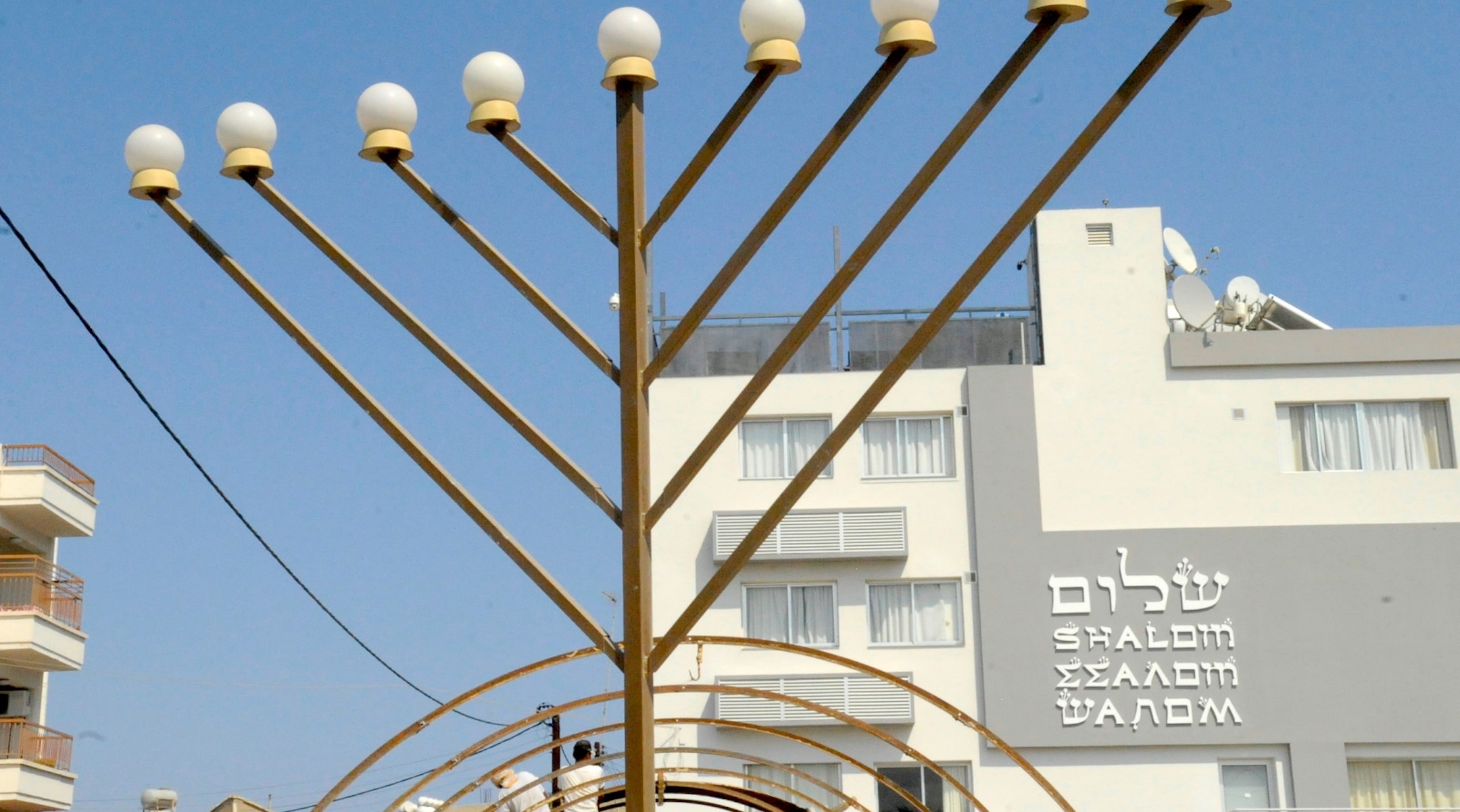
Beit Chabad in Lanarca is a hub of Jewish life for all of Cyprus. (Larry Luxner)
Raskin, 47, has been in Cyprus for the past 22 years. He and his wife, Shaindl, have eight children and a granddaughter. Since opening Chabad’s Cyprus headquarters in Larnaca, he’s since expanded to Orthodox synagogues in Agia Napa, Limassol, Nicosia and Paphos as well.
Sopher moved to Cyprus in July with her husband, a software developer, and daughters Emily and Gaya. Through a friend, she quickly found a job at Chabad taking care of children. The move had come after a weeklong trip to Cyprus in May, made just to check things out.
Now she sees her future, and that of her children, on this Mediterranean island.
“Most of the Israelis living in Cyprus don’t want to go back. Their lives are here now,” she said. “You’re out of the craziness, but close enough that you can go there and return the same day.”
Keep Jewish Stories in Focus.
(JEWISH REVIEW) has documented Jewish history in real-time for over a century. Keep our journalism strong by joining us in supporting independent, award-winning reporting.

